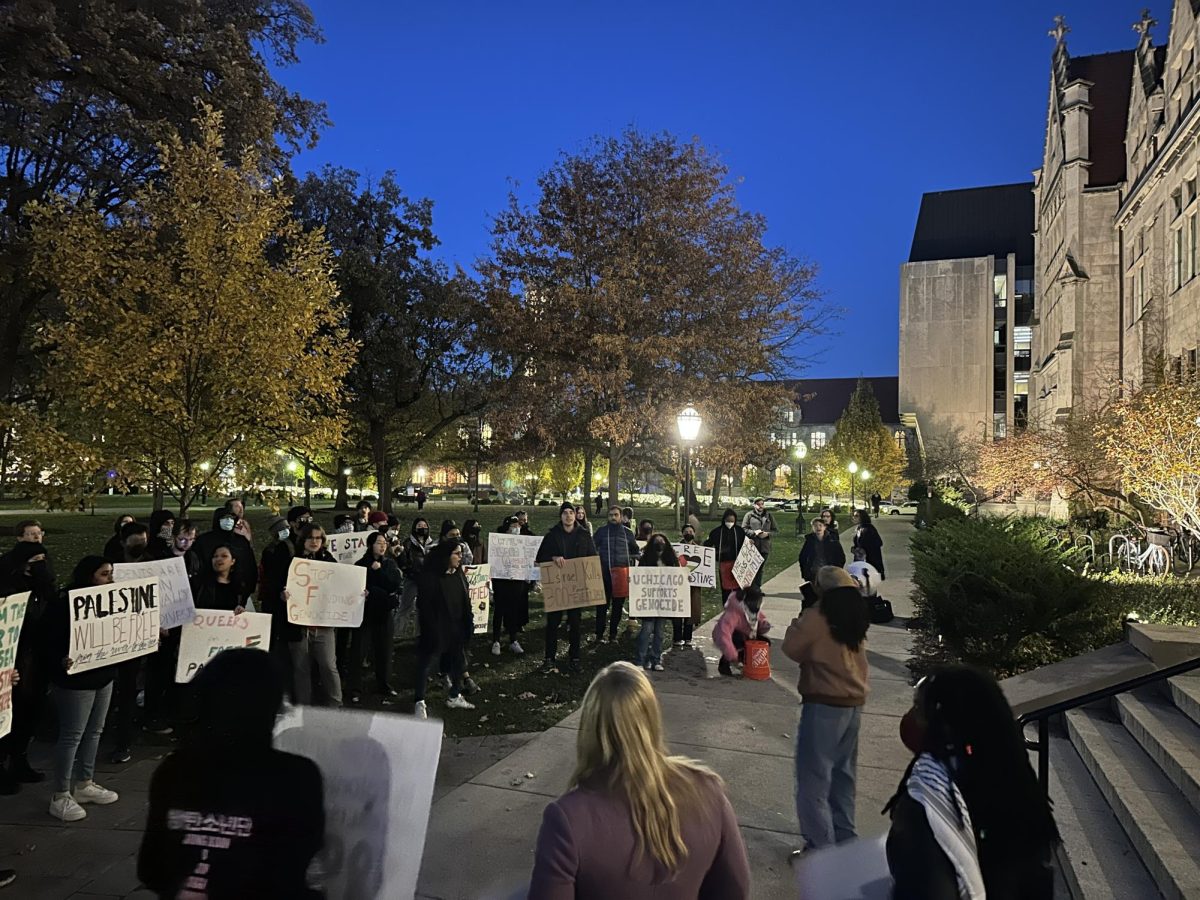
Nikhil Jaiswal
Protestors rallied and chanted outside of Rosenwald Hall on November 9, 2023.
Has the time come to ask whether the activism of Students for Justice in Palestine (SJP) belongs on our campus? It’s not the morally reprehensible things they say that brings this question to the fore, as their speech is protected, but how they behave: in a way that violates campus rules and disrupts the University’s mission.
One thing I’ve absorbed in my 37 years at this University is that no matter how detestable speech can be, it should never be banned or suppressed. Even if discourse tests one’s limits of tolerance, a university functions best when all ideas can be expressed. Take, for example, SJP’s long op-ed in The Maroon—updated from a piece written on October 11—justifying the butchery of Israelis by Hamas on October 7. In a breathtakingly obtuse and euphemistic statement, SJP claims that “the events of the past week have been historic and unprecedented by all measures. Last Saturday, for the first time in history, Palestinian resistance groups broke out of Gaza, reclaimed land from the Israeli occupation, and seized control of numerous Israeli military posts.” The “breaking out of Gaza,” as they call it, included a massive amount of violence and destruction. According to a tally of official Israeli statistics conducted by Al Jazeera, 1,139 people died, and there were mass rapes and other forms of sexual violence. Additionally, 240 hostages were taken, most of them still in captivity. And, of course, no land was reclaimed. This statement alone, in line with the national organization’s similar pronouncement (complete with the logo of an armed Hamas paraglider), renders SJP morally reprehensible, odious, and hateful, seemingly promoting terrorism. But although I believe any moral person should be sickened by these words, they constitute protected free speech, don’t violate University regulations, and should be discussed openly—as I just did. What should make us question whether SJP belongs on campus is not because it says loathsome things like this, but because of the actions it takes.
At the end of last year, the organization and its umbrella group, UChicago United for Palestine (the latter not a recognized student organization), have repeatedly violated the University’s Protest and Demonstrations Policy, including by engaging in demonstrations during prohibited hours without permits, deplatforming a group of peacefully assembled Jewish students, sitting-in in campus buildings, disrupting classes using loud megaphones, and blocking access to buildings. While these actions have led to some arrests, the legal charges have been dropped. This still leaves the possibility of institutional punishment, but whether the University will pursue the charges, or what the punishments will be—if any—are never disclosed to the University community. Unless punishments for such violations become public (names need not be given), there is no deterrent to illegally disrupting University activities. Punishments for other prohibited behaviors, like sexual harassment and assault, are publicized in a yearly report, so why not trespassing?
SJP does not aim to further campus discourse about the Israel–Hamas war, but rather to bully the rest of us into accepting their ideological views through verbal intimidation and interference with our mission to teach, learn, and do research. Violation of university policies has led to SJP being banned on other campuses, including Columbia University and The George Washington University.
The continual disruption of our campus and violation of University regulations raises the question of whether SJP as a campus group is involved in these actions. If so, we should ponder whether that group should be a recognized student organization. At the very least, student organizations should enrich the mission of the University: promoting discourse and enriching our intellectual life. SJP does none of this, for their mission seems to be purely ideological: to promote Hamas and whitewash its terrorism—as well as to erase the state of Israel—all through disrupting campus activity. If it is to remain, it should at least desist from violating University regulations.
Finally, to deter organizations from such violations, it’s imperative that our administration not only warn and then punish violators, but also let us know that punishments have been levied. If University regulations of conduct aren’t enforced, they become toothless. And that simply encourages further disruption.
Jerry A. Coyne is professor emeritus in the Department of Ecology and Evolution.
Editor’s note, January 25, 2024: This piece was updated to more accurately reflect updated reporting on the casualty count of the October 7 attacks. This was done with the consent of and in collaboration with the piece’s author.